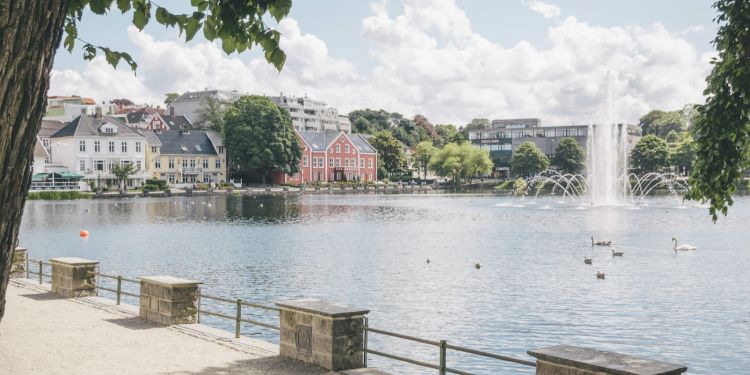Pioneering urban models to create resilient cities

Researchers at the University of Leeds use computer models to understand the complicated reality of urban life – cities, transport, and social behaviour – to co-design sustainable futures.
With computational modelling, researchers create and evaluate scenarios for cities and urban systems, to understand and tackle problems like congestion, air quality, and social inequalities.
One example is the research led by Dr Jiaqi Ge, University Academic Fellow in the School of Geography, which uses models to understand the effects of the net-zero energy transition.
She is looking at three cities that are reliant on oil: Aberdeen (UK), Macae (Brazil), and Stavanger (Norway), focusing on the socioeconomic transformations that they are facing in the transition away from fossil fuels.
Following the 2014 oil price crash, Stavanger successfully diversified into renewable energy and digital technologies with strong government support.
Aberdeen experienced a more severe economic contraction with significant job losses and population decline, while Macae confronted serious socioeconomic challenges, compounded by broader national political instabilities.
These varied responses provide valuable insights into how different contexts shape resilience to energy transition.
Advanced modelling techniques
At the University of Leeds, researchers create and use state-of-the-art modelling techniques including agent-based modelling, cellular automata, and machine learning algorithms, which capture the dynamic and emergent behaviours of urban systems.
These advanced techniques enable the simulation and prediction of urban dynamics with greater accuracy.
In her project, Dr Ge used computer simulations of urban transitions to look at the patterns that apply to cities going through industrial transformations.
She found that economically disadvantaged areas often experience the greatest improvements in property values and employment, while affluent neighbourhoods demonstrate greater resilience during decline.
Results showed the importance of redirecting skilled workers rather than recruiting externally, to limit socioeconomic inequality.
In addition, the models highlighted the importance of looking to the housing markets to predict transition success or difficulties.
Ineffective transitions could make residents 'trapped’ – in declining industrial areas, they become unable to sell their houses, creating concentrated zones of economic disadvantage that last generations.
Transformation is inevitable – but it must be equitable
The imperative to address climate change requires cities, particularly fossil fuel-dependent ones, to transform their ways of working. The way they do it will decide whether they emerge as centres of green innovation or face socioeconomic difficulties.
Dr Ge said: “Our international comparative research demonstrates that successful transitions integrate climate objectives with social equity considerations, creating pathways for existing workforces to participate in emerging green industries.”
“Cities that develop strategies tailored to their specific historical, economic and social contexts achieve more successful outcomes than those applying generic transition models.
“Our research provides policymakers with evidence-based tools to design transitions that distribute benefits across their communities.”
Working with communities, industry and government
The University of Leeds’s work with urban modelling fosters collaboration between academia, government agencies, industry partners, and local communities.
By engaging stakeholders throughout the research process, the work builds capacity for collective action and co-creation of solutions to urban problems, enhancing the resilience and adaptive capacity of cities in a rapidly changing world.
By modelling emerging behaviours in urban systems, researchers provide valuable insights to support evidence-based decision-making for resilient, inclusive, and sustainable cities.
This understanding helps stakeholders, including urban planners, policymakers, and community leaders, make informed decisions about the development and management of cities.




